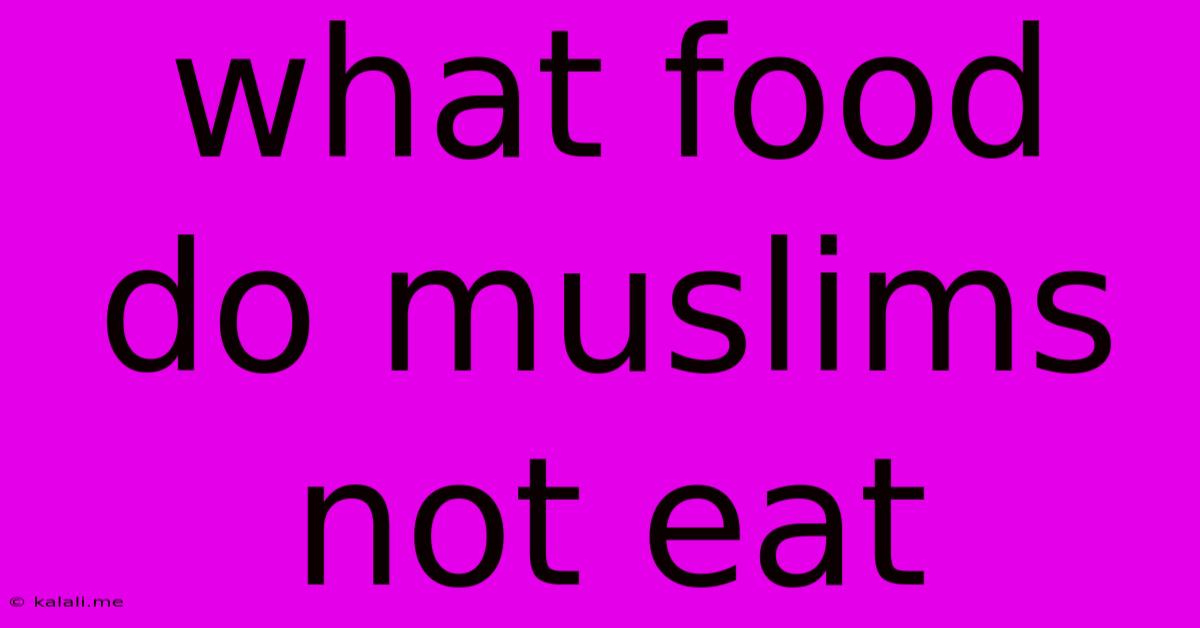What Food Do Muslims Not Eat
Kalali
Jun 07, 2025 · 3 min read

Table of Contents
What Food Do Muslims Not Eat? A Guide to Halal and Haram
Muslims follow Islamic dietary laws, known as Halal and Haram, which dictate what foods are permissible and forbidden. Understanding these guidelines is crucial for anyone interacting with Muslim communities or simply curious about Islamic culture. This article will explore the key principles of Halal and Haram, focusing on what foods Muslims generally avoid. This guide is for informational purposes and does not constitute religious advice.
What is Halal and Haram?
Halal (حلال) means permissible or lawful in Arabic, referring to foods and actions allowed in Islam. Haram (حرام) means forbidden or unlawful, encompassing things Muslims are prohibited from consuming or doing. These guidelines are derived from the Quran and Sunnah (the teachings and practices of Prophet Muhammad).
Foods Generally Considered Haram:
The most well-known Haram foods are:
-
Pork and Pork Products: This includes all parts of the pig, including meat, lard, and gelatin derived from pork. This is a strict prohibition.
-
Blood and Blood Products: Consuming blood in any form is forbidden. This includes blood sausage and certain types of meat preparation.
-
Carrion (Meat of Dead Animals): Animals that have died naturally, without proper slaughter, are not permitted.
-
Animals Not Properly Slaughtered: Islamic slaughter (Zabiha) involves specific procedures ensuring the animal is rendered unconscious before the throat is cut, allowing for the complete draining of blood. Animals that have not undergone this process are considered Haram. This applies to land animals like cattle, sheep, goats, camels, and birds. Exceptions exist for seafood.
-
Animals Considered Haram: Specific animals are inherently forbidden, regardless of how they are slaughtered. This includes:
- Dogs and Cats: While considered unclean in many cultures, Islamic dietary laws specifically prohibit these animals.
- Reptiles and Amphibians: Snakes, lizards, frogs, and other such creatures.
- Predatory Animals: Lions, tigers, bears, and other carnivorous animals.
-
Alcohol and Intoxicating Substances: The consumption of alcohol in any form is strictly forbidden in Islam. This includes alcoholic beverages and food containing alcohol as an ingredient.
-
Meat from Animals Sacrificed to Idols: Meat offered as sacrifices to idols or deities other than God is Haram.
Foods That May Be Haram Depending on Circumstances:
-
Seafood: Most seafood is considered Halal, however, shellfish (like shrimp, crab, lobster) is typically avoided. Different schools of thought within Islam hold varying views on certain shellfish.
-
Gelatin: Many processed foods contain gelatin, which can be derived from pork or beef. Muslims should carefully check ingredients to ensure it's Halal-certified.
-
Additives and Preservatives: Some food additives and preservatives may be derived from Haram sources. Checking for Halal certification is crucial.
Finding Halal Food:
Many countries have a growing awareness of Halal food requirements. Look for Halal certification on food packaging, and when dining out, inquire about the preparation methods of food. Many Muslim-owned restaurants and businesses specialize in Halal food.
Conclusion:
Understanding the Halal and Haram guidelines provides valuable insight into the Islamic dietary laws. While this article provides a general overview, it’s crucial to consult reliable Islamic sources for detailed information. Observing Halal dietary practices is an essential part of Islamic faith and lifestyle. Remember to always be respectful of dietary restrictions and cultural practices.
Latest Posts
Latest Posts
-
How Much Horsepower Does A Human Have
Jun 07, 2025
-
Can You Use Pressure Treated Wood For Wall Studs
Jun 07, 2025
-
2 Words That Sound The Same
Jun 07, 2025
-
Prime Rib How Much Per Person
Jun 07, 2025
-
Glassdoor Reviews For My New Job Are Bad
Jun 07, 2025
Related Post
Thank you for visiting our website which covers about What Food Do Muslims Not Eat . We hope the information provided has been useful to you. Feel free to contact us if you have any questions or need further assistance. See you next time and don't miss to bookmark.